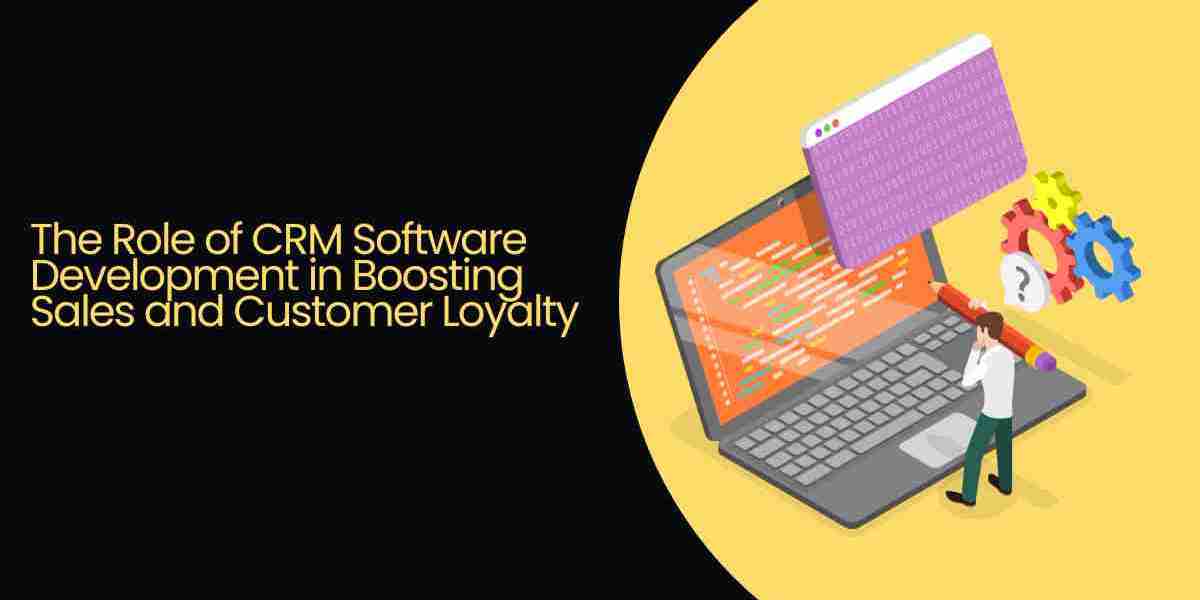The bedrock of any successful business is its relationships with customers. In an increasingly competitive and digitally-driven landscape, merely attracting customers isn't enough; retaining them and fostering their loyalty is paramount for sustained growth. This is where the strategic implementation of Customer Relationship Management CRM software development plays an indispensable role. In 2025, CRM is far more than just a contact database; it's a sophisticated, intelligent ecosystem designed to supercharge sales processes and cultivate unbreakable customer bonds.
The Evolution of CRM: From Data Storage to Strategic Powerhouse
Historically, CRM systems were primarily used to store customer contact information and track basic interactions. While useful, their capabilities were limited. Today, however, CRM software development has evolved into a strategic imperative, integrating cutting-edge technologies to offer comprehensive solutions that touch every aspect of the customer journey. The emphasis has shifted from simply managing relationships to actively enhancing them, driving both immediate sales and long-term loyalty.
The contemporary role of CRM is defined by its ability to:
- Provide a Unified Customer View (360-degree): Consolidating all customer data – from initial contact and marketing engagement to sales interactions, purchase history, service requests, and social media activity – into a single, accessible platform. This eliminates silos and ensures every department has a complete understanding of each customer.
- Automate and Streamline Workflows: Automating repetitive tasks in sales, marketing, and customer service, freeing up human resources to focus on higher-value activities.
- Generate Actionable Insights: Leveraging advanced analytics and AI to derive meaningful intelligence from vast datasets, predicting customer behavior, identifying sales opportunities, and personalizing interactions.
- Enhance Communication and Collaboration: Facilitating seamless internal communication across teams and consistent, personalized external communication with customers across various channels.
Boosting Sales: How CRM Drives Revenue Growth
Custom CRM software development is a powerful engine for sales growth, optimizing every stage of the sales funnel and empowering sales teams to close deals more efficiently and effectively.
Optimized Lead Management and Qualification:
- Centralized Lead Capture: CRM systems automatically capture leads from various sources – website forms, social media, email campaigns, live chat, and events – ensuring no potential opportunity is missed.
- Intelligent Lead Scoring: Leveraging AI and machine learning, advanced CRM solutions analyze lead demographics, firmographics, and engagement behavior to assign a score, indicating their likelihood to convert. Sales teams can then prioritize high-potential leads, focusing their efforts where they matter most.
- Automated Lead Nurturing: CRM can trigger automated email sequences, personalized content delivery, and follow-up reminders based on lead behavior, nurturing prospects through the sales pipeline until they are ready for direct sales engagement.
Streamlined Sales Processes and Pipeline Management:
- Visual Sales Pipeline: CRM provides clear, visual dashboards of the sales pipeline, allowing sales managers and representatives to track the progress of every deal, identify bottlenecks, and forecast sales accurately.
- Activity Tracking and Management: Every interaction – calls, emails, meetings, notes – is logged and associated with the relevant customer record. This ensures that every team member has the complete context for a conversation, reducing redundant efforts and improving communication.
- Automated Task Assignment: CRM can automatically assign tasks and reminders to sales reps based on predefined triggers (e.g., follow-up after a demo, send a proposal), ensuring consistency and preventing opportunities from falling through the cracks.
Enhanced Personalization and Targeted Selling:
- Deep Customer Understanding: With a 360-degree view, sales reps can access a customer's entire history, preferences, and pain points. This allows for highly personalized conversations, tailored product recommendations, and solutions that genuinely address the customer's needs.
- Cross-selling and Upselling Opportunities: By analyzing past purchase behavior and customer profiles, CRM identifies opportunities for cross-selling complementary products or upselling premium versions, directly contributing to increased revenue per customer.
- Targeted Marketing Campaigns: CRM data enables marketing teams to segment customers accurately and create highly targeted campaigns that resonate with specific audience groups, feeding qualified leads back into the sales funnel.
Improved Sales Forecasting and Reporting:
- Data-Driven Forecasts: By analyzing historical sales data, current pipeline status, and lead scoring, CRM provides more accurate sales forecasts, enabling better resource allocation and strategic planning.
- Performance Analytics: Managers can track individual and team performance, identify top performers, pinpoint areas for improvement, and optimize sales strategies based on real data, not just intuition.
Cultivating Customer Loyalty: The Long-Term ROI of CRM
While boosting sales is critical, true business growth comes from customer retention and loyalty. Custom CRM software development is the linchpin in building these lasting relationships.
Personalized Customer Experiences at Scale:
- Anticipating Needs: By analyzing purchase history, preferences, and past interactions, CRM allows businesses to anticipate customer needs and proactively offer relevant products, services, or support, making customers feel truly understood and valued.
- Consistent Omnichannel Communication: CRM ensures a seamless experience across all communication channels – email, phone, social media, live chat, in-person interactions. A customer starting a conversation on one channel can pick it up on another, with the agent having full context, leading to frustration-free interactions.
- Targeted Loyalty Programs: CRM systems integrate with loyalty programs, allowing businesses to track customer rewards, deliver personalized offers based on engagement, and incentivize repeat purchases, making customers feel appreciated and recognized.
Proactive and Efficient Customer Service:
- Faster Issue Resolution: When a customer contacts support, the agent has immediate access to their entire interaction history, purchase details, and previous service requests. This eliminates the need for customers to repeat themselves, leading to quicker and more effective problem-solving.
- Proactive Support: For products with IoT integration, CRM can receive alerts about potential issues (e.g., a smart appliance malfunctioning) and trigger proactive outreach to the customer, addressing problems before they even become aware of them.
- Self-Service Portals: Many modern CRM solutions include self-service portals where customers can find answers to FAQs, track their orders, or log support tickets, empowering them to resolve issues independently and reducing the burden on support teams.
Gathering and Acting on Customer Feedback:
- Integrated Feedback Mechanisms: CRM facilitates the collection of customer feedback through surveys, reviews, and direct communication channels.
- Actionable Insights from Feedback: The system centralizes this feedback, allowing businesses to analyze trends, identify common pain points, and pinpoint areas for improvement in products, services, or processes. This shows customers their opinions matter and leads to continuous enhancement.
- Reducing Churn: By tracking customer sentiment and identifying "at-risk" customers (those showing signs of dissatisfaction or disengagement), CRM enables proactive interventions to resolve issues and prevent churn before it happens.
Building Brand Advocates:
- Exceptional Experiences Drive Advocacy: When customers consistently receive personalized, efficient, and proactive service, they are more likely to become brand advocates, recommending the business to others through word-of-mouth and social media.
- Community Building: Some CRM platforms integrate with community forums or social media, allowing businesses to foster online communities where customers can interact, share experiences, and receive support, further strengthening loyalty.
The Future of CRM Development in 2025 and Beyond
Looking ahead, CRM software development will continue to embrace hyper-personalization, intelligent automation, and deeper integration with emerging technologies:
- Generative AI in CRM: Expect AI-powered chatbots capable of more complex conversations, AI assistants that draft emails or sales proposals, and predictive analytics that offer even more nuanced customer insights.
- Voice and Conversational Interfaces: Interacting with CRM systems via natural language will become more common, streamlining data entry and retrieval for sales and service teams.
- Even Deeper IoT Integration: Real-time data from connected products will provide an even richer context for customer interactions, enabling highly proactive service and product development driven by actual usage data.
- Blockchain for Data Integrity and Security: As data privacy concerns grow, blockchain may be used to create immutable records of customer interactions, enhancing trust and compliance.
- Low-Code/No-Code Platforms: These platforms will empower business users to customize and integrate CRM functionalities without extensive coding, accelerating deployment and adaptation.
In 2025, CRM is unequivocally a strategic investment, not just a departmental tool. Its ability to provide a unified customer view, automate critical processes, and leverage data for deep insights directly translates into increased sales efficiency and unwavering customer loyalty. For any business aiming to thrive in the modern economy, robust CRM software development is no longer optional; it's the core of a sustainable, customer-centric growth strategy.



